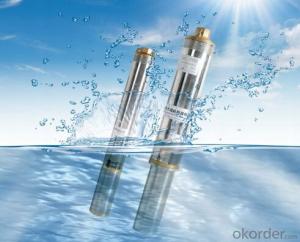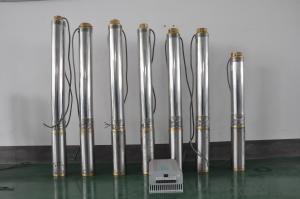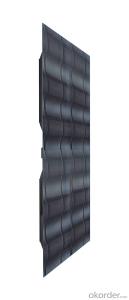Solar Water Pump Centrifugal Pump System 0.65KW for Agricultural Irrigation
- Loading Port:
- Shanghai
- Payment Terms:
- TT OR LC
- Min Order Qty:
- 10 pc
- Supply Capability:
- 1000 pc/month
OKorder Service Pledge
OKorder Financial Service
You Might Also Like
Solar Water Pump Centrifugal Pump System 0.65KW for Agricultural Irrigation
The photovoltaic pumping system is different from the traditional AC pumping system , and the photovoltaic pumping system utilizes solar cells convert solar energy into electric energy , then the photovoltaic pumping inverter drives ac motor for the pump running , and pumping up water from water well , river , lake etc areas and then transport to the destination to satisfy our requests for the water demand .
Photovoltaic arrays adopts solar radiation energy to convert it to electric power ,providing the motive power for the whole system . And the function of the solar pumping inverter is converting the DC power output from PV array to AC power to drive the pump to finalize the water pumping up as well as adjusting the output power real-timely according to the change of sunlight intensity , in this way , the system realizes the max power point tracking and the solar energy can be utilized furthest
The whole system solves the water pumping up requests perfectly , omitting the battery bank and charge controller etc equipments , so it is very economical and environmental . Since they are with the merits of low carbon , energy conversation , environmental protection etc , so they have a broad market foreground and great social value
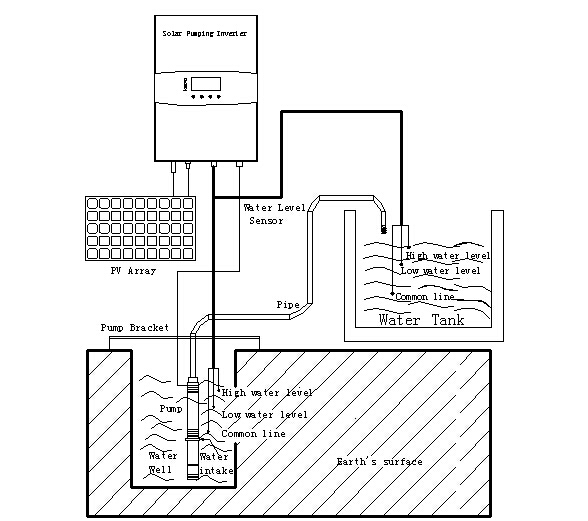
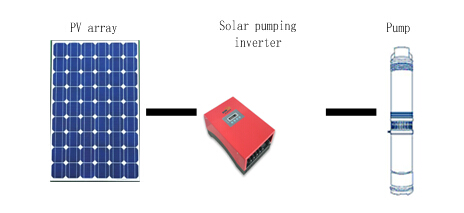
2.2 Application
Agricultural irrigation
Desert manage
Domestic water
Grassland animal husbandry
city waterscape
Island water supply
Landscape and fountain system of municipal engineering , city square , hotels and residence community
2.3 About product
This product is using a high performance digital signal processing chip, can provide solution for solar water pumpingsystem with high cost performance. Solar pumping system as a whole block diagram as shown in 2.
SHP series inverter has the following features:
a. True max power tracking technology (TMPPT) with our own intellectual property; effectively improve the use ratio of PV array. The stable tracking efficiency can reach 99.2% , Solving the problem of bad tracking efficiency and running unstability under the situation of sunlight intensity quick change when comparing with the traditional MPPT method .
b. Adopt efficient IPM power module from Mitsubishi Company with high reliability.
c. With the function of high and low water level detection , high safety factor.
d. Automatic anti-drying protection function , with multi-protection for motor
e. Multi-language LCD display , easy for operation , very user-friendly
f. The independent developed principal computer with our own intellectual properties , remote monitoring is available
g. Modular design , direct plug-in terminal , good-looking appearance, easy for installation , operation and maintenance .
h. Suitable for the pump adopted three phase asynchronous motor
i. Complete digital control , with the function of full automatic running and data storage .
j. Perfect protection system , with the protection function for lighting , over voltage , under voltage , short circuit , over loads , water drain off , low sunlight , over heating etc ,
k. Adopt the complete radiating system , so radiating efficiency is better and the service life is longer
l. Through strict environmental test , adapt the rigorous environment :-10℃~+50℃
m.No impacted mains supply power switch function (optional ), All-weather running available
n. Through strict environmental test , adapt the rigorous environment :-10℃~+50℃
FAQ
1. How fast will my system respond to a power outage?
Our solar inverters typically transfer to battery power in less than 16 milliseconds (less than 1/50th of a second).
2. What kind of batteries do the systems include?
Our solar backup electric systems use special high-quality electric storage batteries.
3. How do I install my system?
A solar backup inverter is connected to a home electric system , we will supply detailed installation manual and videos for our customers .
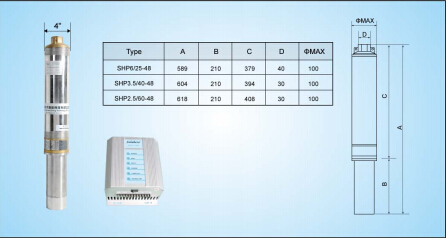
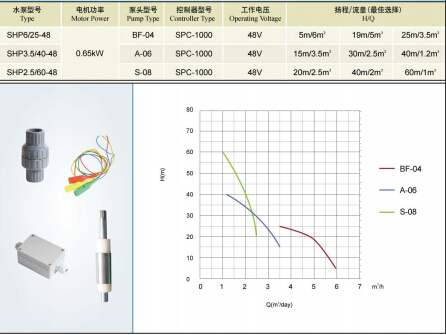
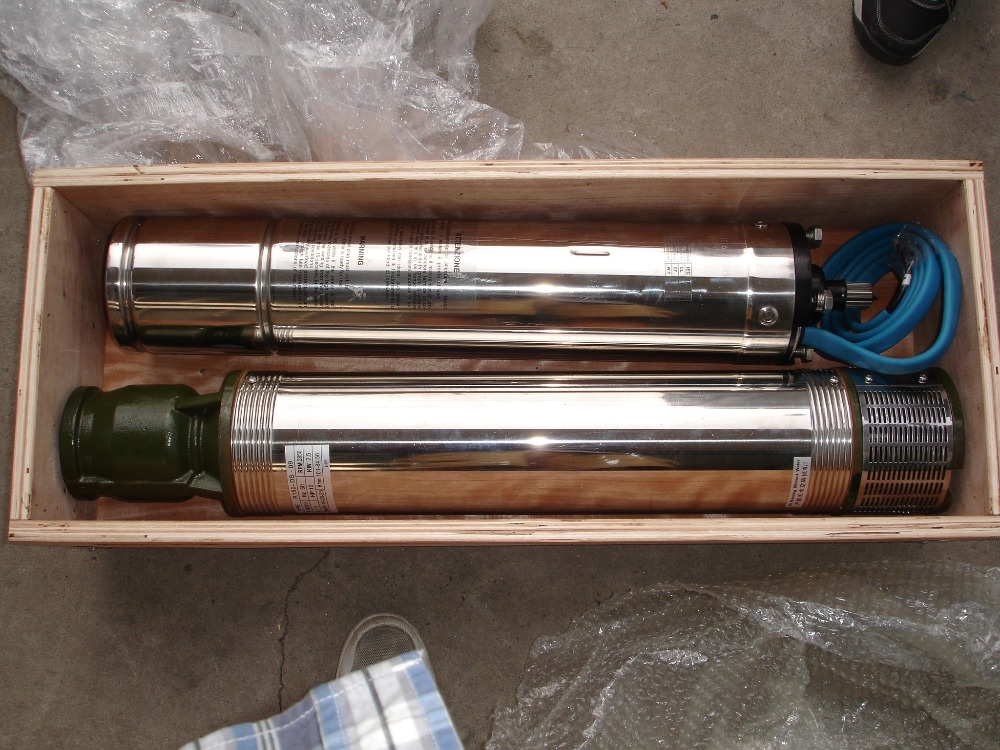
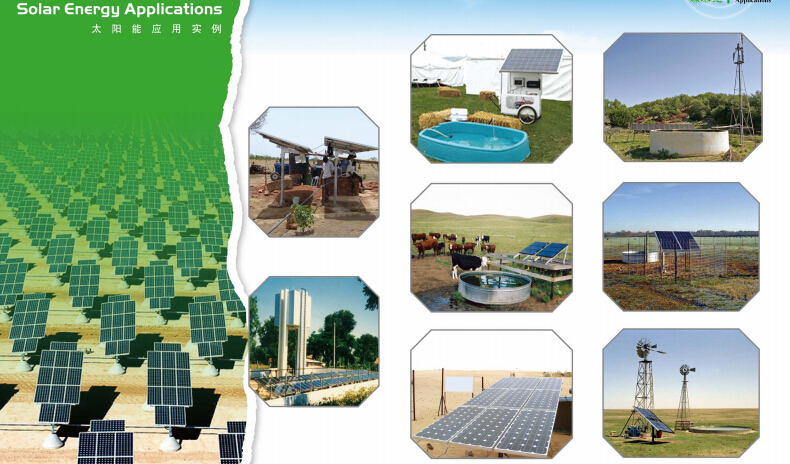
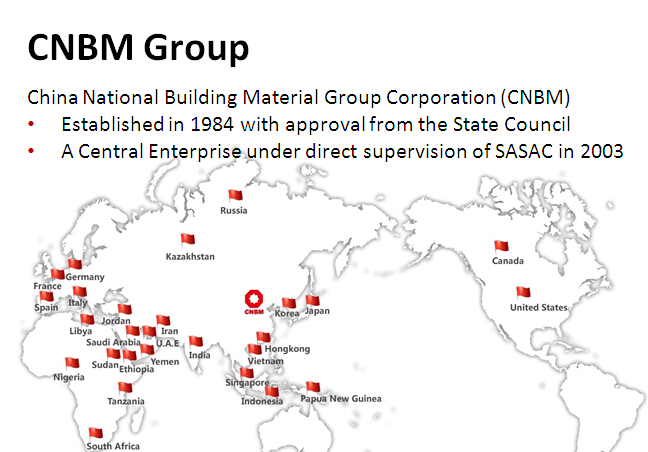



- Q:How does the maintenance cost of a solar pump system compare to a traditional electric pump?
- Compared to traditional electric pumps, solar pump systems generally have lower maintenance costs. This is because solar pumps have fewer moving parts and no complex electrical systems, reducing the risk of mechanical failure and the need for extensive maintenance. Solar pumps operate using solar panels, which have a long lifespan and require minimal upkeep. The primary maintenance tasks for a solar pump system involve regularly checking and cleaning the solar panels to ensure optimal performance. Additionally, occasional maintenance may be required for the pump itself, such as lubrication and inspection of connections. On the contrary, traditional electric pumps require more frequent maintenance due to the complexity of their electrical systems and moving parts. These pumps often have motors, wiring, and other components that can wear out over time, necessitating maintenance or replacement. The electrical connections also need to be regularly inspected and maintained to prevent potential issues. Furthermore, traditional electric pumps are typically connected to the grid, making them susceptible to fluctuations in electricity prices. This can result in higher operational costs compared to solar pumps, which rely on the sun's energy and do not incur ongoing electricity expenses. Overall, although both solar pump systems and traditional electric pumps require maintenance, the maintenance cost of a solar pump system tends to be lower due to its simpler design, fewer moving parts, and reduced reliance on external power sources.
- Q:Does a solar pump require a separate controller?
- Yes, a solar pump typically requires a separate controller. The controller regulates the power input from the solar panels to the pump, ensuring efficient operation and protection against overvoltage or overloading. It also includes features like MPPT (Maximum Power Point Tracking) to optimize the pump's performance by tracking the maximum power output of the solar panels.
- Q:How does a solar pump handle water with high alkalinity?
- A solar pump can handle water with high alkalinity without any issues. The alkalinity of the water does not affect the functioning or efficiency of the solar pump in any way.
- Q:Can a solar pump be used for waterfalls and cascades in gardens?
- Yes, a solar pump can be used for waterfalls and cascades in gardens. Solar pumps are designed to harness energy from the sun and convert it into power to run water features. They are a sustainable and eco-friendly option, providing a reliable source of energy to create stunning waterfalls and cascades in gardens without the need for electricity or traditional pumps.
- Q:Can a solar pump be used in areas with high snowfall or ice conditions?
- A solar pump can indeed be used in areas with high snowfall or ice conditions. While extreme weather conditions may present challenges for solar panels, there are multiple ways to ensure the proper functioning of a solar pump in such regions. Firstly, the solar panels can be installed at an angle to facilitate the easy sliding off of snow. Additionally, anti-icing coatings or heating elements can be integrated into the panels to prevent the accumulation of ice. Moreover, the pump system can be designed with freeze protection mechanisms like insulation and heat tracing to avoid the freezing of water or pipes. By implementing these measures, solar pumps can effectively operate in areas with high snowfall or ice conditions, serving as a dependable and sustainable water pumping solution.
- Q:Can a solar pump be used for firefighting or emergency water supply?
- Yes, a solar pump can be used for firefighting or emergency water supply. Solar pumps are powered by sunlight, so they do not require electricity from the grid or fuel to operate. This makes them an ideal solution for remote locations or during power outages. Solar pumps can be used to extract water from wells, rivers, or other water sources and can provide a reliable supply of water for firefighting or emergency situations. Additionally, solar pumps are environmentally friendly as they do not produce greenhouse gas emissions or require fossil fuels. However, it is important to ensure that the solar pump has the necessary capacity and capabilities to meet the specific requirements of firefighting or emergency water supply.
- Q:Can solar pumps be used for water supply in beach resorts or tourist destinations?
- Yes, solar pumps can be used for water supply in beach resorts or tourist destinations. Solar pumps are an environmentally friendly and cost-effective solution to provide water for various purposes, including drinking, bathing, and irrigation. They can harness solar energy to pump water from wells, rivers, or lakes, eliminating the need for traditional electricity sources. This makes them ideal for remote locations like beach resorts or tourist destinations where access to electricity might be limited. Additionally, solar pumps require minimal maintenance and have a long lifespan, making them a reliable and sustainable choice for water supply in such locations.
- Q:What is the expected lifespan of the solar panels in a solar pump system?
- The expected lifespan of solar panels in a solar pump system can vary depending on several factors. On average, most solar panels have a lifespan of about 25 to 30 years. However, with proper maintenance and care, they can last even longer. The durability of solar panels is influenced by various factors, such as the quality of the materials used, the manufacturing process, and the environmental conditions in which they are installed. High-quality panels made from durable materials tend to have a longer lifespan. Regular maintenance and cleaning of the solar panels are essential to maximize their lifespan. Dust, dirt, and debris can accumulate on the surface, reducing their efficiency over time. Cleaning them periodically and ensuring they are free from any shading or obstructions can help maintain their performance and extend their lifespan. Additionally, extreme weather conditions such as hail, heavy snow, or strong winds can potentially damage solar panels. However, modern solar panels are designed to withstand these conditions to a certain extent. So, it is crucial to choose panels with good weather resistance, especially if you live in an area prone to severe weather events. In conclusion, the expected lifespan of solar panels in a solar pump system is typically around 25 to 30 years, but it can be extended with proper maintenance and care. Choosing high-quality panels and ensuring they are regularly cleaned and protected from extreme weather conditions can help maximize their lifespan.
- Q:Can a solar pump be used for irrigation in orchards?
- Indeed, the utilization of solar pumps for irrigation in orchards is entirely feasible. Not only are these pumps highly efficient, but they are also environmentally friendly, making them an ideal choice for delivering water to crops, including orchards. By harnessing solar energy, these pumps can operate without the need for electricity or fuel. Moreover, solar pumps can be customized to cater to the specific irrigation requirements of orchards, ensuring a consistent water supply during dry periods or precise delivery to the root zone. Additionally, they can be enhanced with sensors and automated systems to optimize irrigation schedules and water consumption. Ultimately, solar pumps offer an economical and sustainable solution for orchard irrigation.
- Q:How does a solar pump handle freezing temperatures?
- A solar pump typically handles freezing temperatures by utilizing a built-in freeze protection system. This system prevents the pump from freezing and getting damaged by automatically draining the water from the pump and associated pipes when temperatures drop below a certain threshold. This ensures that no water is left inside the pump or pipes, eliminating the risk of freezing and potential damage.
1. Manufacturer Overview |
|
|---|---|
| Location | |
| Year Established | |
| Annual Output Value | |
| Main Markets | |
| Company Certifications | |
2. Manufacturer Certificates |
|
|---|---|
| a) Certification Name | |
| Range | |
| Reference | |
| Validity Period | |
3. Manufacturer Capability |
|
|---|---|
| a)Trade Capacity | |
| Nearest Port | |
| Export Percentage | |
| No.of Employees in Trade Department | |
| Language Spoken: | |
| b)Factory Information | |
| Factory Size: | |
| No. of Production Lines | |
| Contract Manufacturing | |
| Product Price Range | |
Send your message to us
Solar Water Pump Centrifugal Pump System 0.65KW for Agricultural Irrigation
- Loading Port:
- Shanghai
- Payment Terms:
- TT OR LC
- Min Order Qty:
- 10 pc
- Supply Capability:
- 1000 pc/month
OKorder Service Pledge
OKorder Financial Service
Similar products
New products
Hot products
Hot Searches
Related keywords
